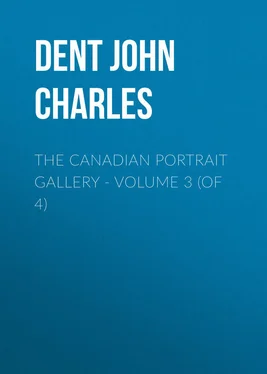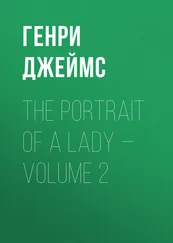John Dent - The Canadian Portrait Gallery - Volume 3 (of 4)
Здесь есть возможность читать онлайн «John Dent - The Canadian Portrait Gallery - Volume 3 (of 4)» — ознакомительный отрывок электронной книги совершенно бесплатно, а после прочтения отрывка купить полную версию. В некоторых случаях можно слушать аудио, скачать через торрент в формате fb2 и присутствует краткое содержание. Жанр: foreign_antique, foreign_prose, на английском языке. Описание произведения, (предисловие) а так же отзывы посетителей доступны на портале библиотеки ЛибКат.
- Название:The Canadian Portrait Gallery - Volume 3 (of 4)
- Автор:
- Жанр:
- Год:неизвестен
- ISBN:нет данных
- Рейтинг книги:5 / 5. Голосов: 1
-
Избранное:Добавить в избранное
- Отзывы:
-
Ваша оценка:
- 100
- 1
- 2
- 3
- 4
- 5
The Canadian Portrait Gallery - Volume 3 (of 4): краткое содержание, описание и аннотация
Предлагаем к чтению аннотацию, описание, краткое содержание или предисловие (зависит от того, что написал сам автор книги «The Canadian Portrait Gallery - Volume 3 (of 4)»). Если вы не нашли необходимую информацию о книге — напишите в комментариях, мы постараемся отыскать её.
The Canadian Portrait Gallery - Volume 3 (of 4) — читать онлайн ознакомительный отрывок
Ниже представлен текст книги, разбитый по страницам. Система сохранения места последней прочитанной страницы, позволяет с удобством читать онлайн бесплатно книгу «The Canadian Portrait Gallery - Volume 3 (of 4)», без необходимости каждый раз заново искать на чём Вы остановились. Поставьте закладку, и сможете в любой момент перейти на страницу, на которой закончили чтение.
Интервал:
Закладка:
The successive dignities thus heaped upon him are sufficient evidence of the rising favour with which he was regarded by the Members of the Government; and as matter of fact he had made great progress in the esteem of the leading members of his Party generally. On the 22nd of May, 1872, he received the appointment which was destined to give Canadians a special interest in his career — that of Governor-General of the Dominion of Canada.
By the great mass of Canadians the news of this appointment was received with a feeling very much akin to indifference. The fact is that, except among reading men, and persons intimately familiar with the diplomatic history of Great Britain during the preceding twenty years, the name of Lord Dufferin was entirely unknown in this country. A few middle-aged and elderly persons remembered that an Irish peer named Lord Dufferin had made an eloquent speech on the death of the Prince Consort. Others remembered that a peer of that name had done something noteworthy in Syria. A few had read or heard of "Letters from High Latitudes;" but not one of us suspected that the new Governor-General was destined to be the most popular representative of Great Britain known to Canadian history. It was not suspected that, for the first time during many years, we were to have at the head of our Administration a statesman of deep sympathies and enlarged views; a nobleman combining elegant learning and brilliant powers of oratory with a tact and bonhomie which would win for him the friendship and respect of Canadians of all social ranks, and of all grades of political opinion. By many of us the office of a Governor-General in Canada had come to be looked upon as a sort of sinecure; as a part which any man not absolutely a dunce is capable of playing. We regarded the Governor-General merely as the Royal representative; as a figurehead whose duties consist of doing as he is bid. He has responsible advisers who prescribe for him a certain line of action, and all he has to do is to obey. When his Cabinet loses the confidence of Parliament, he either sends them about their business or accepts their resignation. The successors selected for him by the dominant majority are accepted as a matter of course, and everything goes on da capo . This, or something like this, was the way we had learned to estimate the powers and functions which Lord Dufferin was coming among us to discharge. It was reserved for him to give us a juster appreciation of the position of a Canadian Governor-General. The lesson learned by us during the six years of his residence among us is one that Canadians will not soon forget. The learning of it has perhaps made us unduly exacting, and it would have been most unfortunate had his successor been chosen from the ranks of respectable mediocrity whence Colonial Governors are not unfrequently selected. Happily the choice fell upon a gentleman whose character and attainments bear some affinity to those of his predecessor, and the dignity and respect due to the Governor-General are not likely to suffer depreciation while the office remains in his hands.
There was one circumstance which led many Canadians to look upon the appointment of Lord Dufferin with no friendly eyes. He had been appointed by the Gladstone Government, and the Gladstone Government had manifested a disposition to treat Canada rather cavalierly. Canadian interests had not been very efficiently cared for at the negotiation of the Treaty of Washington, and there had been a good deal of diplomatic correspondence between the Canadian and Imperial Governments, in which the latter had pretty clearly intimated that Canada's separation from the Mother Country would not be regarded as an irreparable loss to the Empire at large. The London Times openly advocated such a separation, and it was known to speak the sentiments of persons high in power. It was even conjectured by some of the more suspicious that Lord Dufferin had been appointed for the express purpose of carrying out an Imperial project for a separation between Canada and Great Britain. Had His Lordship been a weak or commonplace man he would most probably have had a very uncomfortable time of it in Canada. He was neither weak nor commonplace, however, and he began to be popular from the very hour of his arrival in the country. By the time he had been six months among us everyone spoke well of him; and long before his administration came to an end he had gained a firm hold on the hearts of the people throughout the length and breadth of our land.
He arrived at Quebec on the 25th of June, 1872. During the same day he was sworn in as Governor-General, and two days later reached his seat of Government at Ottawa. There is no need to describe in minute detail the various events which characterized his administration. Those events are still fresh in all our memories, and have been recorded at full length by two Canadian authors — Mr. Stewart and Mr. Leggo — in works to which everyone has access. For these reasons it is considered unnecessary to give more than a brief summary in these pages.
During the summer of 1872 Lord Dufferin made the first of his memorable Vice-Regal tours, visiting Toronto, Hamilton, London, Niagara Falls, and other places of interest in the Province of Ontario. To say that he made a marvellously favourable impression wherever he went is simply to say what everybody knows, and what might equally be said of all his subsequent progresses through the Dominion. There was a general election during the summer and autumn of this year, and an opportunity was thus afforded His Excellency for observing the working of our political institutions at such a time.
The result of the elections was a majority in favour of Sir John A. Macdonald's Ministry. Parliament met in the following March, and on the 2nd of April Mr. Huntington made his serious, and now historic, charge against the Government, in connection with the granting of the Pacific Railway Charter, and the corrupt sale to Sir Hugh Allan. A motion was made for a committee of investigation, but was voted down as a motion of want of confidence in the Government. A few days later, Sir John, knowing that a policy of reticence could not long be available, himself moved for a committee. The motion was passed, and the committee was appointed, but was unable to proceed, owing to its inability to take evidence on oath. A Bill was introduced into the House to give the committee the power required, and was passed without opposition, but was subsequently disallowed by the Imperial Government as being ultra vires . Meanwhile the inquiry was proceeded with; but on the 5th of May, owing to the absence from the country of three important witnesses — Sir George E. Cartier, Sir Hugh Allan and the Hon. J. J. C. Abbott — the committee deemed it advisable to adjourn to the 2nd of July. The ordinary Parliamentary business had been got through with, and there was no necessity for the House remaining in session; but, as the committee had no authority to sit during recess, it was thought desirable that there should be an adjournment of Parliament instead of a prorogation, until the committee should be prepared with its report. Accordingly, on the 23rd of May, Parliament adjourned to the 13th of August, when it was agreed that it should meet expressly for the purpose of receiving the committee's report, and not for the despatch of ordinary legislative business. It would thus be unnecessary for the Governor-General to be present at the formal reassembling, and soon after the adjournment His Excellency, with his family, started on a projected tour through the Maritime Provinces. On the 27th of June, while on his travels, he received a telegram from Lord Kimberley, Secretary for the Colonies in the Home Government, announcing the disallowance of the "Oaths Bill," as it was called, viz., the Act authorizing Parliamentary committees to examine witnesses under oath. He at once gave notice of the disallowance to the Premier, Sir John A. Macdonald, who made it known to the committee. The committee was composed of five members, three of whom were supporters of the Government, and the remaining two of the Opposition. The Government supporters were the Hon. J. G. Blanchet, the Hon. James Macdonald (of Pictou), and the Hon. John Hillyard Cameron. The Opposition members were the Hon. Edward Blake and the Hon. A. A. Dorion. On the 1st of July a proclamation was issued giving public notice of the disallowance of the Oaths Bill. The Premier offered to issue a Royal Commission to the committee, which would enable it to take evidence under oath, and to demand the production of persons, papers and records. The proposal was rejected by Messrs. Blake and Dorion, who wrote to the Premier pointing out to him that the inquiry was undertaken by the House; that the appointment of a Royal Commission by a Government to investigate charges against that Government would be an unheard-of and most unbecoming proceeding; and that the House did not expect the Crown or anyone else to obstruct the inquiry.
Читать дальшеИнтервал:
Закладка:
Похожие книги на «The Canadian Portrait Gallery - Volume 3 (of 4)»
Представляем Вашему вниманию похожие книги на «The Canadian Portrait Gallery - Volume 3 (of 4)» списком для выбора. Мы отобрали схожую по названию и смыслу литературу в надежде предоставить читателям больше вариантов отыскать новые, интересные, ещё непрочитанные произведения.
Обсуждение, отзывы о книге «The Canadian Portrait Gallery - Volume 3 (of 4)» и просто собственные мнения читателей. Оставьте ваши комментарии, напишите, что Вы думаете о произведении, его смысле или главных героях. Укажите что конкретно понравилось, а что нет, и почему Вы так считаете.












